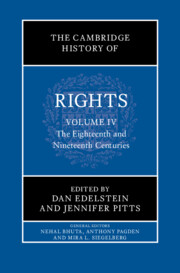Book contents
- the cambridge history of rights
- The Cambridge History of Rights
- The Cambridge History of Rights
- Copyright page
- Contents
- Figures
- Contributors to Volume IV
- General Introduction
- A Note on Translations
- Introduction to Volume IV
- Part I A Revolution in Rights?
- Part II Postrevolutionary Rights
- Part III Rights and Empires
- 18 Rights and Empires
- 19 Rights in Late Mughal and Early Colonial India
- 20 Rights in the Americas
- 21 The Free Sea
- 22 Abolition and Imperialism in Africa
- 23 Rights in Pan-Asian, Pan-Islamic, and Pan-African Thought
- 24 Indigenous Rights in Settler Colonies
- 25 Catholicism and Rights
- 26 (Human) Rights Associations (1775–1898)
- Index
- References
24 - Indigenous Rights in Settler Colonies
from Part III - Rights and Empires
Published online by Cambridge University Press: 22 January 2025
- the cambridge history of rights
- The Cambridge History of Rights
- The Cambridge History of Rights
- Copyright page
- Contents
- Figures
- Contributors to Volume IV
- General Introduction
- A Note on Translations
- Introduction to Volume IV
- Part I A Revolution in Rights?
- Part II Postrevolutionary Rights
- Part III Rights and Empires
- 18 Rights and Empires
- 19 Rights in Late Mughal and Early Colonial India
- 20 Rights in the Americas
- 21 The Free Sea
- 22 Abolition and Imperialism in Africa
- 23 Rights in Pan-Asian, Pan-Islamic, and Pan-African Thought
- 24 Indigenous Rights in Settler Colonies
- 25 Catholicism and Rights
- 26 (Human) Rights Associations (1775–1898)
- Index
- References
Summary
By recovering fragments of the political negotiations that took place between native peoples and European colonizing powers in the settler colonies of Canada and Australia, this chapter argues that treaty-making was central to the ability of Indigenous peoples to assert the rights they wanted, rather than those they were granted, against imperial and colonial states. In settler colonies, colonial states used the principles of protection and assimilation to establish the legal status of Indigenous peoples to create them as subjects within a particular legal order that set the place of everyone in relation to the sovereign. Without a treaty, Indigenous peoples were effectively placed in a position where they could only claim rights that were compatible with the aims of protection in the nineteenth century, and so were defined by the colonial authorities. Yet the language of ‘rights’ could restrict, or even distort, some of the political arguments that Indigenous peoples wanted to assert, for example in relation to hunting and fishing rights that Europeans understood in terms of access to resources in order to secure their subsistence.
- Type
- Chapter
- Information
- The Cambridge History of Rights , pp. 565 - 594Publisher: Cambridge University PressPrint publication year: 2024

